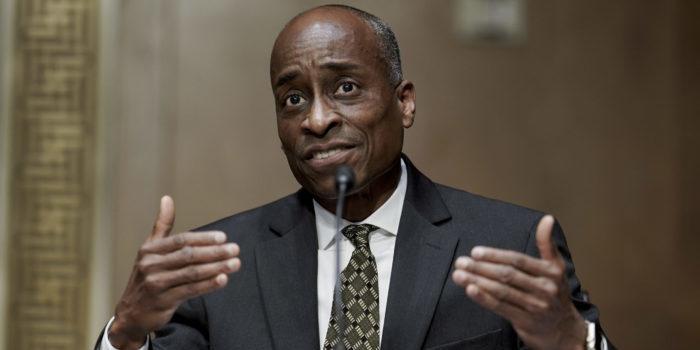(Headline USA) Even as rising interest rates and subsequent bank failures heralded the possible coming of a total collapse of the U.S. economy in coming months, the Biden administration touted the ethnic diversity of new Federal Reserve appointments as being among its top criteria.
President Joe Biden has nominated Philip Jefferson, one of two recently appointed African–American members on the Federal Reserve’s Board of Governors, to serve as vice chair of the board, the White House announced Friday.
Along with fellow board member Lisa Cook, Biden raised eyebrows last year in nominating the two, not based on their qualifications, per se, but on their skin tone.
He also nominated Sarah Bloom Raskin, a far-left extremist with radical views that would effectively have introduced Marxism into the central bank. Despite being the wife of Democrat Rep. Jamie Raskin, D-Md., she failed to secure enough votes in the evenly-split Senate, with Sen. Joe Manchin, D-W.Va., refusing to back her.
Biden has also now chosen Adriana Kugler, a Georgetown University economist, to join the Fed’s board. If confirmed by the Senate, she would become the first Hispanic American on the Fed’s interest-rate-setting committee.
Biden’s choice of Kugler follows long-standing demands by Sen. Robert Menendez, a New Jersey Democrat, that a Latino be chosen for the rate-setting committee for the first time in the Fed’s 109-year history. Menendez voted last year against Biden’s nomination of Powell for a second four-year term to protest the lack of Latino officials at the Fed.
The two nominations arrive as the Fed is grappling with an increasingly fraught economy marked by rising interest rates, still-high inflation and a shaky banking system.
Since March 2022, the Fed has raised its benchmark interest rate 10 times, to the highest level in 16 years, to combat high inflation. After a policy meeting last week, Chair Jerome Powell signaled that the Fed may now pause its rate increases.
In the coming months, the Fed will face tough decisions about whether to keep rates unchanged for the rest of this year or resume raising them. The policymakers might even consider cutting rates should a recession occur later this year, as many economists expect.
Jefferson, 61, who first joined the Fed’s board barely a year ago, would become the second black man to serve as the Fed’s No. 2 official if confirmed by the Senate. He would replace Lael Brainard, who left in February to become Biden’s top economic adviser.
As vice chair, Jefferson would join an inner circle of policymakers that includes Powell and the president of the Federal Reserve Bank of New York, John Williams.
Kugler, 53, who has a background in international and labor economics, is on leave from Georgetown to serve as the United States’ representative on the board of the World Bank. During the Obama administration, she was the Labor Department’s chief economist, from September 2011 to January 2013.
Biden also announced that he plans to re-nominate Cook to a full 14-year term on the Fed’s board. Cook, 58, who was narrowly confirmed by the Senate, joined the board last May to fill an unexpired term that will end on Jan. 31, 2024.
“These nominees understand that this job is not a partisan one, but one that plays a critical role in pursuing maximum employment, maintaining price stability and supervising many of our nation’s financial institutions,” Biden said in a statement.
After the Fed’s policy meeting last week, Powell said that while inflation remains far above the Fed’s 2% target, turmoil in the banking sector could lead to tighter credit for businesses and households and weaken the economy. That could allow the Fed to end its rate-hiking campaign.
Jefferson and Kugler have won Senate approval before. Jefferson sailed through the Senate on a 91-7 vote last May. Kugler was confirmed to her World Bank position by a unanimous voice vote last April.
Both Jefferson and Kugler would vote on financial regulatory policy, an area that has assumed a higher profile after the collapse of three large banks, as well as on interest rate decisions.
As a Fed governor, Jefferson has voted in favor of all the rate hikes the central bank has imposed since joining the central bank in May 2022. He has also echoed Powell’s concerns that unemployment will likely have to rise, at least modestly, to bring inflation down to the Fed’s 2% target.
Jefferson has also emphasized the need to keep Americans’ inflation expectations in check. Like many economists, Jefferson has expressed concern that such expectations can become self-fulfilling: If businesses and workers start to expect high inflation to persist, both will seek to offset rising costs by either charging higher prices or demanding higher pay. Both trends can then further intensify inflation.
Given such concerns, some analysts consider Jefferson to lean slightly “hawkish” in his policy views. Hawks typically prefer higher interest rates to ward off inflation, while “doves” generally support lower rates to boost hiring.
In recent remarks, Jefferson expressed confidence in the U.S. banking system and said that data showing that banks are tightening credit are consistent with the Fed’s efforts to slow the economy. He added that inflation is declining and that the “economy has started to slow in an orderly fashion.”
Jefferson, who grew up in a working-class family in Washington, D.C., according to an interview with the American Economic Association, has focused his economic research on poverty and monetary policy. Before joining the Fed, he was an economist and administrator at Davidson College in North Carolina.
Kugler has conducted extensive research on worker training in the United States and Colombia. One of her recent papers studied the effects of extended U.S. unemployment benefits during two pre-pandemic recessions. Her study found that the additional aid helped people take more time to find jobs that fit their skills and qualifications.
Kugler earned a Ph.D. in economics from the University of California, Berkeley. Jefferson obtained his doctorate in economics from the University of Virginia.
Adapted from reporting by the Associated Press

